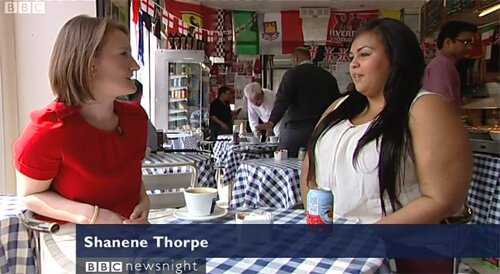How Cameron’s new modernising advisor sees the Conservative party
Andrew Cooper is to become Downing Street director of strategy, having been head of the pollster Populus.
There was a nervous reaction from Tim Montgomerie, the influential editor of ConservativeHome, who quickly tweeted:
Andrew Cooper once described the Tory grassroots as “vile” to me. And now he’s head of strategy for David Cameron.
There is good evidence that they have substantive reasons to be nervous.
The new director of strategy certainly takes a pretty much diametrically opposed view of why the Tories fell short at the last election to that offered in the ConservativeHome post-election inquest.
Cooper strongly supports the thesis that the Conservatives fell short because voters did not feel that they had changed enough – which does indeed cast the Tory party as much more the problem than the solution.
Surprisingly little attention has been paid to the evidence that Cameron is no longer seen as more centrist than his party by the public. But Cooper will probably fear the truth in Ed Miliband’s observation that “we are seeing the recontamination of the Tory brand“.
This was how I reported Andrew Cooper’s critique of the Tory election campaign for the New Statesman.
He said last night that the strategic weakness of the Tory campaign was always to respond with an “unremittingly negative” attack on Gordon Brown, which failed to take on board how far the decisive electoral question remained voters’ doubts about the Conservatives. This meant that they failed to secure enough support – most notably in Scotland, in London (particularly among non-white voters), and among public-sector workers and the less well-off, where those who agreed it was time for a change remained repelled by the risk of the “same old Tories”.
As the Tory leadership realised this, they began to make “much more detailed preparations for a hung parliament than anybody realised”, Cooper said.
Cooper was, in effect, voicing a significant criticism of George Osborne’s approach to electoral and campaign strategy. Osborne was the voice of the “relentlessly negative” messaging which, on Cooper’s analysis, simply poured energy and resources into an argument the Tories had already won.
After the 2005 election, Cooper produced a presentation which emphasised that 79% of Tory voters felt the party was “on the right track to get into power before too long” but only 28% of non-Tories agreed.
Cooper and Michael Gove offered a route-map, according to Tim Bale’s book, for the Cameroons.
1. Always try to see ourselves through the voters’ eyes.
2. Talk about the issues that matter most to voters (not the issues that we’re most at home with).
3. Use the language of people, not the language of politicians.
4. “Tell people what we stand for – not (just) what is wrong with Labour. Unless we give voters new reasons to support us they won’t.
5. Remember Tim Bell’s rule: ‘if they haven’t heard it, you haven’t said it’ – so repetition is vital.
6. Respect modern Britain. If we seem not to like Britain today, the feeling will surely be reciprocated.
7. Don’t be shrill or strident – that’s not how normal civilised people behave.
8. Remember that whatever we are talking about, the most important message is what we are saying about ourselves.
9. Face the fact that we lost people’s trust because of how we behave (and sound) as well as what we say”.
10. Focus on the voters we have to win, don’t preach to the converted.
11. Be disciplined and consistent.
The focus on turning the Tories into ‘normal civilised people’ does suggest a particular view of the party as mainly containing idiosyncratic, swivel-eyed ideologues.
What is also striking now is just how strongly the emphasis is on etiquette and behaviour, and just how little there is on political content.
Perhaps one of the lessons of David Cameron’s incomplete and shallow modernisation of his party is that good manners are important, but not a substitute for a political strategy.
—
A longer version of this article is at Next Left
Most Libdems have also started to shift against the cuts
The Independent on Sunday/Sunday Mirror ComRes polling yesterday brought bad news for the Coalition, as John Rentoul sets out, with opinion shifting against the government on every front.
The long lost “fair cuts” argument haemhorrages further. Trailing by 28-57% on whether the government is cutting too severely and too fast suggests the these ‘cuts are necessary’ case is in increasing trouble too.
continue reading… »
Work with us to stop Pickles, say Labour councillors today
A government source confirms to The Times (£) that Eric Pickles’ relationship with local councils has become dysfunctional.
They hate him and he hates them.
As a result, LibDem council leaders have asked Nick Clegg to step in so that they don’t have to deal with the Tory Community Secretary.
continue reading… »
Eric Pickles’ crusade in Whitehall is being exposed for its unfairness
Many of the most senior Liberal Democrats in local government have attacked the government’s local government spending settlement, publicly declaring no confidence in the fairness of the government’s approach to cuts and in Communities Secretary Eric Pickles who the LibDems accuse of “gunboat diplomacy” in an extraordinary letter to The Times (£).
As The Times reports (£):
The grassroots of the Liberal Democrats have declared open revolt over the scale and pace of cuts to frontline local services.
How voters see Cameron, Clegg and Miliband on the political spectrum
Voters no longer believe that David Cameron is more centrist than the Conservative party as a whole, having changed their minds about this since May. That is one of the striking and potentially politically significant findings of a YouGov/Prospect poll (see graphic here).
Voters are asked to use a 200 point scale, with 0 as the centre, and where -100 is very left-wing and +100 is very right wing.
The average voter continues to think of themselves as very close to the political centre, though there has been a mild lean leftwards among the electorate.
The January 2011 survey now puts the average 3 points to the left-of-centre, compared to 1 point right-of-centre in May 2010. There are other interesting findings too.
continue reading… »
How do lefties prevent people like Boris getting a tax cut?
The Daily Telegraph secured an interview in Davos with the newspaper’s own columnist Boris Johnson, who also works as the Mayor of London.
His political prescriptions are often rather vague. He wants the government to show a bit of Thatcher and Tebbit – taking on the unions – but rather more Heseltine too, in having a proper plan for growth.
continue reading… »
Five similarities between Hillary Clinton and Ed Balls
As Ed Balls takes up the key role of Shadow Chancellor for the Labour Opposition, in many ways the politician he most resembles is US Secretary of State Hillary Clinton.
Here are five parallels between the two.
continue reading… »
Ed Balls and the Tory trap
Those Conservatives who are over-excited about Balls’ appointment for this reason risk luring themselves further into the trap of preaching only to the converted.
If their core problem in May 2010 was that running against Gordon Brown was not enough, it seems rather curious to hope that it might be their salvation in 2015.
Last May, three-quarters of the public wanted a change from Labour. Where the Conservatives failed was in making their own case.
continue reading… »
Labour’s huge Oldham victory in context
Congratulations to Labour’s Debbie Abrahams who has won the Oldham East and Saddleworth by-election with an increased majority in the party’s first by-election outing under Ed Miliband’s leadership.
The result is a disappointment for LibDem candidate Elwyn Watkins, following his successful court challenge to ex-Labour MP Phil Woolas.
Strikingly, Labour’s majority and vote share was higher than in the 1997 General Election. The Coalition parties saw their joint share fall from 58% to 44.7% (-13.3 on 2010). The swing from the joint LibDem and Conservative to Labour was 11.8%, which is similar to the current opinion poll standings.
This is the result for the major three parties (out of ten candidates).
Debbie Abrahams (Labour) 14718 42.1% (+10.2)
Elwyn Watkins (LibDem) 11160 31.9% (+0.3)
Kashif Ali (Conservative) 4481 12.8% (-13.6)UKIP: 2029 (5.8%)
BNP 1560
Green 530
Monster Loony: 145
English Dems: 144
Pirate: 96
Bus Pass Elvis: 67
Labour majority: 3558
Turnout: 34930
Turnout at 48% in a by-election held in the first fortnight in January has been higher than most commentators anticipated.
The Liberal Democrats are taking consolation from holding their vote share up. But election expert John Curtice has cast doubt on the importance of this, given that it seems to have been achieved through the collapse of the Tory vote share. This, Curtice argues, is a weak indicator of how most LibDem MPs will perform against Conservative opposition.
Curtice has told the BBC “it is a night of quiet pleasure for Labour if not necessarily riotous celebration” and a worrying result for the Conservatives.
2010
Labour: 31.9
LibDem: 31.6
Tory: 26.4
Labour majority 103
The by-election majority is larger than the 1997 General Election result (despite the turnout then being 25 points higher).
1997
Labour: 41.7
LibDem: 35.4
Tory: 19.7
Labour majority 3389
Turnout 73.92%
2001
Labour: 38.6
LibDem: 32.6
Tory: 16.1
Labour majority 2726
Turnout 61.0%
2005
Labour: 41.4
LibDem: 33.2
Tory: 18.2
Labour majority 3590
Turnout 57.3%
The constituency was new in 1997 – and the results since can be found here.
Conservatives and the media are being left behind on public opinion
An 8 point lead for the Labour Party in one opinion poll is just one poll, though the party has good reasons to be confident about its prospects not only in Oldham East and Saddleworth on Thursday, but also in national elections in Scotland and Wales as well major local elections in four months time.
But this may tell us something about how the government is turning voters off – and about how most media commentary has missed how they have done so for most of the last six months.
“There is no alternative” isn’t working – and it will now have diminishing returns with people who aren’t core supporters of the government.
continue reading… »
You can read articles through the front page, via Twitter or RSS feed. You can also get them by email and through our Facebook group.
» There are alternatives to the reckless ‘Plan A’
» On Beecroft: it is already quite easy to sack people
» Why Cameron’s claim of 600,000 jobs created is plainly wrong
» By using age to allocate NHS funding, Lansley rewards Tory voters
» The rise in domestic violence deaths is not an “isolated” problem
» Adrian Beecroft highlights mindset of Tory right
» The US is now a model for the Eurozone to save itself
» The IMF plan to revive the economy doesn’t go far enough
» The Boris brand is weaker than his friends think
» Nine things you can do to halt Lansley’s destruction of our NHS
» Incidents like this shame us all
|
No Comments 56 Comments 19 Comments 44 Comments 10 Comments 24 Comments 22 Comments 69 Comments 44 Comments 25 Comments |
LATEST COMMENTS » BenM posted on There are alternatives to the reckless 'Plan A' » Shatterface posted on Do older people really need more NHS healthcare? » GO posted on Do older people really need more NHS healthcare? » Cylux posted on On Beecroft: it is already quite easy to sack people » Chaise Guevara posted on On Beecroft: it is already quite easy to sack people » Chaise Guevara posted on How Newsnight demonised a single mother » Trooper Thompson posted on On Beecroft: it is already quite easy to sack people » Chaise Guevara posted on How Newsnight demonised a single mother » Chaise Guevara posted on The rise in domestic violence deaths is not an "isolated" problem » Chris posted on How Newsnight demonised a single mother » Duncan Weldon posted on There are alternatives to the reckless 'Plan A' » Kojak posted on How Newsnight demonised a single mother » Richard posted on How Newsnight demonised a single mother » vimothy posted on The rise in domestic violence deaths is not an "isolated" problem » Dawn Willis posted on How Newsnight demonised a single mother |










